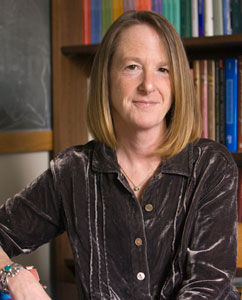Sarah Spence
 Distinguished Research Professor 2009
Distinguished Research Professor 2009
Sarah Spence, professor of classics, is a prolific writer on a broad range of topics from classical antiquity to contemporary rhetoric. She is considered one of the most distinguished literary scholars of her generation. Spence’s many pioneering contributions (among them her 10 volumes and 59 articles and reviews), her ability to bridge disciplines in her writings, and her strong national and international reputation combine to set her apart. She recently began work on Sicily and the Poetics of Empire, an ambitious study of Sicily in the European imagination from Vergil to Dante. Trained as a comparatist with special interests in the Western literary tradition, she is also well known for what one reviewer calls her “original way of bringing classical texts into new conjunctions with their medieval avatars.” Beyond the respect she enjoys for her own writing, Spence is appreciated for her work as founding editor of Literary Imagination, a journal she edited from 1999 to 2006. Like her own scholarly and creative output, the journal under her leadership featured a unique blend of the ancient and modern. It is highly regarded by peers around the world and has won literary praise for her, its authors, and the University of Georgia.
Previous Awards
Albert Christ-Janer Award 2008

 Distinguished Research Professor 2009
Distinguished Research Professor 2009 Distinguished Research Professor 2001
Distinguished Research Professor 2001 Albert Christ-Janer Award 2001
Albert Christ-Janer Award 2001 Albert Christ-Janer Award 2003
Albert Christ-Janer Award 2003 Albert Christ-Janer Award 2005
Albert Christ-Janer Award 2005 Albert Christ-Janer Award 2006
Albert Christ-Janer Award 2006 Albert Christ-Janer Award 2007
Albert Christ-Janer Award 2007 Albert Christ-Janer Award 2009
Albert Christ-Janer Award 2009 Albert Christ-Janer Award 2010
Albert Christ-Janer Award 2010 Albert Christ-Janer Award 2011
Albert Christ-Janer Award 2011